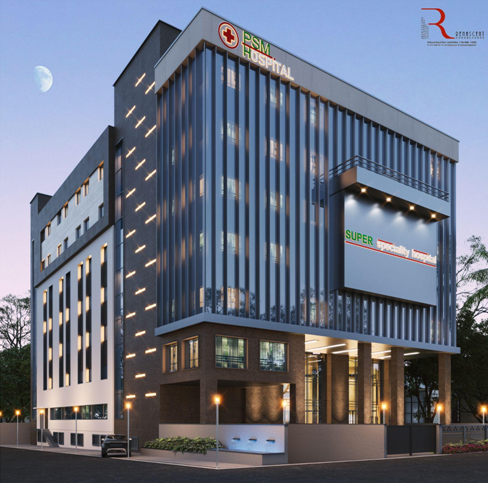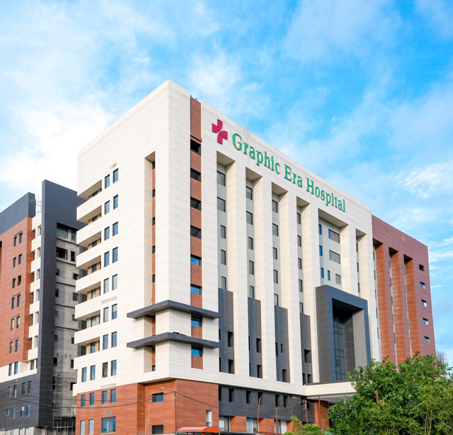
Elevating Healthcare Environments: Harmonizing Aesthetics and Functionality for Optimal Healing
In Healthcare design, crafting spaces that seamlessly merge aesthetics with functionality is paramount. These environments transcend mere structures, serving as catalysts for healing and well-being. Architects, driven by a commitment to patient-centric design, navigate a nuanced landscape where every element serves a purpose. Hence, a design philosophy must fit the current and future requirements. It must be based on functionality, efficiency, flexibility, sustainability and aesthetics which fits perfectly with the current and future requirements. Renascent Consultants, a familiar name designing healthcare facilities in India, aims to cater for patients via their thoughtful design strategy and implementation.
Surpassing Built Forms and Honouring the Human Factor in Design
At the heart of every healthcare project lies a profound understanding of the human experience. Hospitals are not mere buildings but dynamic ecosystems where patients, families, medical professionals, and visitors converge. As such, the design process must prioritise the creation of spaces that not only facilitate medical care but also promote a sense of calm and comfort amidst potentially daunting circumstances.
Recalling Francis DK Ching, who aptly states, 'Architecture is the thoughtful making of space,' a sentiment deeply embedded in hospital design philosophy. Here, the focus extends beyond physical structures to embrace the holistic needs of patients, caregivers, and medical professionals.
Recalling Francis DK Ching, who aptly states, 'Architecture is the thoughtful making of space,' a sentiment deeply embedded in hospital design philosophy. Here, the focus extends beyond physical structures to embrace the holistic needs of patients, caregivers, and medical professionals.
Striking a Chord: Balancing Function and Emotion
Achieving this balance is tricky and a skill in itself. Architects and designers must navigate a complex landscape of needs - ensuring efficient workflows for medical staff, optimal accessibility for patients with varying abilities, and stringent infection control measures. However, this pursuit of practicality should not overshadow the needs of the human experience. Designers must consider factors like natural light, colour palettes, and artwork, all of which contribute to a more positive and calming environment. Bakul Chandra, Co-founder & Mentor at Renascent Consultants, shares that these were the governing principles while conceptualising the PSM Hospital at Haldwani. The said facility has been designed for diverse needs, maximising space, light, security, and sustainability while meeting IGBC Silver rating standards.

Sustainability: Caring for Patients and the Planet
Sustainability emerges as a cornerstone of modern hospital design, with green building practices woven into the fabric of architectural planning. From energy-efficient systems to recycled materials, each decision reflects a commitment to both patient well-being and environmental stewardship. "Our goal is to create structures that are not only visually appealing but also intelligent and sustainable," explains Parul, Co-founder at Renascent Consultants, highlighting her dedication to timeless design principles. The Graphic Era Hospital at Dehradun, a 750-bedded hospital, designed by Renascent Consultants prioritises occupant comfort with a thoughtful design incorporating natural light, and green spaces for enhanced well-being. Using colour as a design element adds vibrance to the space, boosting patient psychology to heal and return to their homes faster.
Every Nook and Cranny: Elements of Impactful Healthcare Design
The design extends far beyond patient rooms. Public areas such as waiting rooms and cafeterias are crucial in reducing stress and creating a sense of community. Careful consideration is given to acoustics, ensuring a calming atmosphere. Access to outdoor spaces, even small courtyards, can offer a much-needed connection to nature and fresh air. For Varun Agarwal, Co-founder at Renascent Consultants, integrating biophilic elements in hospitals and medical institutions enhances healing environments and reduces monotony, fostering connections with nature to promote well-being and accelerate patient recovery.
Optimising Healthcare Environments through Functional Structural Design
Dushyant Kumar, Co-founder at Renascent Consultants, with his structural expertise focuses on optimising architectural layouts to maximise space efficiency, streamline patient care pathways, and facilitate smooth operational workflows for medical staff. With a focus on practicality and precision, he ensures that structural elements are seamlessly integrated to enhance the functionality and effectiveness of healthcare environments.
Hospital design is a constantly evolving field. Architects embrace cutting-edge technologies such as biophilic design principles that incorporate natural elements. By prioritising human-centred design, sustainability, and continuous innovation, architects can create spaces transcending simply treating illness. Interdisciplinary collaboration with healthcare professionals and researchers allows for the integration of evidence-based design strategies, ensuring spaces are aesthetically pleasing and demonstrably improve patient outcomes.
Hospital design is a constantly evolving field. Architects embrace cutting-edge technologies such as biophilic design principles that incorporate natural elements. By prioritising human-centred design, sustainability, and continuous innovation, architects can create spaces transcending simply treating illness. Interdisciplinary collaboration with healthcare professionals and researchers allows for the integration of evidence-based design strategies, ensuring spaces are aesthetically pleasing and demonstrably improve patient outcomes.
